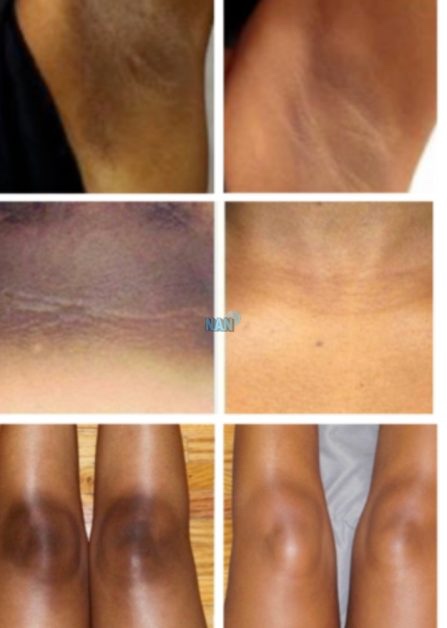By Femi Ogunshola
Humans have always applied different measures and approaches to enhance their physical appearance. These range from transiting from wearing clothes to gradually improving on the quality and designs of the clothes; from erasable beautiful patterns on the skin to the now more durable and sometimes permanent ones called tattoos.
However, one of the approaches to enhance beauty is skin lightening, and in extreme cases whitening, which is commonly referred to as bleaching. Although bleaching cuts across the genders, it is more common among women.
Dr Ninyo Omidiji cautions against skin bleaching to in a desperate attempt to fit into any social group or impress any person or group of persons.
“Dear women, don’t bleach your skin for any son of Adam. Don’t bleach your skin to fit into any pop culture.
“There’s a popular culture that makes beautiful dark, people to think they are ugly unless they become fair. It is only a feeling.” Counsels Omidiji, a medical practitioner and a member of staff of Benue State Teaching Hospital, Makurdi, Benue.
“Our people have been programmed to think a dark skin is inferior to a fair one; that to qualify for being called beautiful, the skin has to be light, fair or white.
“This, to me, is utter balderdash. The sole difference between a fair and a dark skin is the quantity of melanin they contain, which is largely a nature’s adaptation to climatic condition where people live”, he said.
Omidiji’s advice is not without a reason, experts say on the scale of attraction, light-skinned girls rank higher in Nigeria and some other African countries.
The Nigerian entertainment industry who should be a beacon of hope and custodian of culture seems to glorify skin bleaching through songs and roles in movies.
For instance, there is a song in Yoruba dedicated to the fair skin ladies “Omo pupa le mi fe, omo pupa jowo mo feran re” which literarily means “I desire fair skin lady, she is the only one that catches my fancy”.
Observers say that light-skinned women are considered more stunning and more likely to succeed in some fields, such as modeling and movie industry.
Ms Ronke Adeyemi, a former Nollywood actress alleged that one of the criteria a lady must possess to join the Nigeria film industry is to be fair-skinned, regardless of her talents. This perhaps explains why most upcoming Nigerian actresses take to skin bleaching.
This, according to her, can be responsible for why some of them also promote organic skin care and skin toning on their social media platforms.
In 2011, the World Health Organisation (WHO) estimated that nearly 8 out of 10 Nigerian women were bleaching their skins.
Mr Donald Kigali, of Democratic Republic of Congo (DRC), in an online publication took exception to men engaging in bleaching their skin, describing it as an act of irresponsibility.
He said that some parents have also introduced their children and wards to bleaching, a development he described as troubling.
Kigali alleged that after Nigeria, Democratic Republic of Congo should be second in skin bleaching rating, adding that Kinshasa is one of the leading cities of skin bleachers.
“Here people have even gone ahead to embrace zebra crossing marks on the face. Some carry their purple faces as a badge of honour. To be brown in the face and dark on the joints and feet is a mark of high society” he said.
The Nigeria Senate on Feb, 16, 2021, moved to regulate the manufacturing, circulation and use of bleaching creams in the country. The legislative upper chamber had expressed worries over the growing number of small businesses dealing in the formulation and distribution of such products.
Sen. Oluremi Tinubu, representing Lagos Central, who raised the motion, said most of these cosmetics manufacturers did not have the required authorisation and training to deal in skin care products.
“In advanced countries, products must pass a toxicology test and be substantiated for safety before they go on sale. Senate is reminded that the skin is the largest organ of the human body with over 20 physiological functions capable of absorbing products applied,” she was reported as saying.
According to her, studies have shown that depending on ingredients, a substantial amount of products applied topically to the skin is absorbed into the bloodstream.
Dr Folakemi Cole-Adiefe, a dermatologist, at Lagos State University Teaching Hospital (LASUTH), advises against use of chemicals or skin care products that erode the dark skin layer and expose the inner layer, saying that dark skin is a natural adaptation for protection against the sun.
According to her, those who are lighter don’t have as much melanin, which is the pigment in the skin that helps to absorb harmful sun rays to prevent it from penetrating into the skin and cause damage.
Observers say it has become necessary to collectively take steps that will put a stop to skin bleaching. Such steps should include enlightenment on adverse effects of skin bleaching; and where required, those involved in authorised production, distribution and use of such agents should be sanctioned. (NANFeatures).
